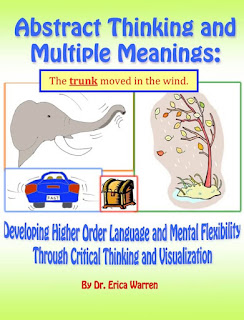This week I wanted to tell you about my online store, Good Sensory Learning. I’m Dr. Erica Warren, and I established this site so I could share all the materials that I have created over the last 20+ years as a learning specialist and educational therapist. When I first began my private practice, Learning to Learn, I had great difficulty finding fun and multisensory materials for my students that were effective and engaging. So back in 2005, I made it my mission to design and distribute high-end, remedial products as well as memorable, motivating lessons that bring delight to learning. If you would like to try a free sampling of my activities , CLICK HERE . How Are the Products Organized at Good Sensory Learning? You can download my Free Printable Catalog or you can browse the site using the grey “search all products” bar in the top right of any page with keywords such as dyslexia, working memory, and executive functioning. What’s more, drop down menus in the red banner allow you t...
In order to teach our students to be critical thinkers, we must step out of the traditional pedagogical paradigm where learners are seen as blank slates that are dependent on their teachers and instead embrace and educational climate in harmony with many anthropological principles. Although andragogy refers to methods used in adult education, this approach offers a much better platform for teaching critical thinking. By embracing a new role as a facilitator, teachers can guide students to uncover intrinsic motivations, interest-based experiences, and problem-solving techniques.
Dr. Erica Warren is the author, illustrator, and publisher of multisensory educational materials at Good Sensory Learning and Dyslexia Materials. She is also the director of Learning to Learn and Learning Specialist Courses.
· Blog: https://learningspecialistmaterials.blogspot.com/
· YouTube Channel: https://www.youtube.com/user/warrenerica1
· Podcast: https://godyslexia.com/
· Store: http://www.Goodsensorylearning.com/ & www.dyslexiamaterials.com
· Courses: http://www.learningspecialistcourses.com/
· Newsletter Sign-up: https://app.convertkit.com/landing_pages/69400
What is Critical Thinking?
Critical thinking requires active learning and advanced reasoning skills. In addition, it involves rigorous questioning and analysis of ideas, assumptions, views, and values in an attempt to solve problems.Why is Critical Thinking Important to Teach?
Critical thinking is a vital skill to teach because it nurtures self-directed learning and helps to train thoughtful and conscientious citizens. In addition, it helps students:
- ponder one's own assumptions, views, and values.
- comprehend the connections between ideas.
- determine the significance of emerging ideas.
- recognize develop, and evaluate differences and misunderstandings in thinking.
- strategize dilemmas using a uniform and orderly plan.
5 Ways to Teach Critical Thinking
There are many ways to teach critical thinking and here are a few of my favorite techniques:
1) Demonstrate critical thinking skills by thinking aloud and demonstrating the needed metacognitive skills.
2) Facilitate deep, round table discussions. Ask questions that challenge students to examine their knowledge and opinions.
3) Utilize Inquiry-Based Learning experiences that enable students to develop skills and viewpoints by investigating scenarios and problems through social experiences.
4) Consider Problem-Based Learning which encourages students to learn in cooperative groups and explore dilemmas, research the topic, brainstorm findings, develop a solution, and create a call to action.
5) Employ Project Based Learning that allows students to investigate and respond to real-life, appealing, and complicated questions, problems, or challenges over a long period of time.
Readymade Materials that Help to Begin the Process of Thinking Critically:
Like any new skill, critical thinking requires a step by step scaffolding approach. I offer a workbook that begins to ask questions that can develop some of these foundational skills. To learn more, click on the following publication: Abstract Thinking Multiple Meanings.
Clearly, students are not blank slates. They come to the classroom with a wealth of knowledge and interests. If we can borrow from the anthropological principles and tap into their curiosities and actively engage them in the learning and creating solutions process, they can develop the needed skills to be critical thinkers as well as active and thoughtful citizens.
 |
| Add caption |
Cheers, Dr. Erica Warren
· Blog: https://learningspecialistmaterials.blogspot.com/
· YouTube Channel: https://www.youtube.com/user/warrenerica1
· Podcast: https://godyslexia.com/
· Store: http://www.Goodsensorylearning.com/ & www.dyslexiamaterials.com
· Courses: http://www.learningspecialistcourses.com/
· Newsletter Sign-up: https://app.convertkit.com/landing_pages/69400


Comments
Post a Comment